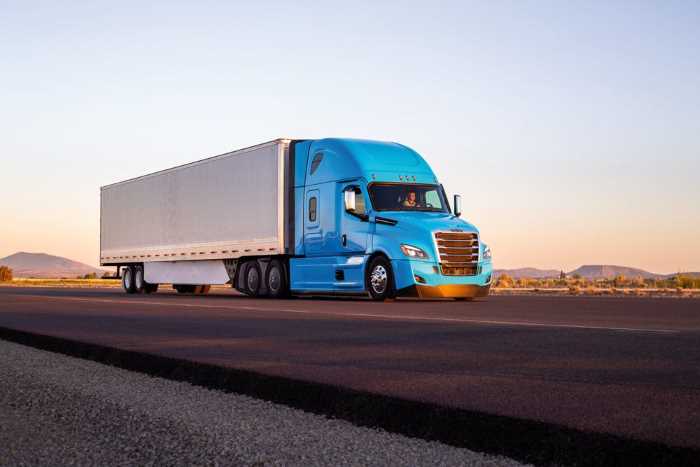For the first seven months of 2023, U.S. sales of new Class 8 trucks exceeded sales in the corresponding month of 2022.
But August brought a change, when year-over-year comparison showed a decline of 1%. September sales were 3.2% lower than September 2022 sales. October sales were down 6.3%. November showed a continuation of the trend, coming in 17.5% lower than November 2022.
According to data received from Wards Intelligence, manufacturers reported U.S. sales of 19,027 new Class 8 trucks in November, representing an 11.2% decline from September sales of 21,417.
For the year to date, 242,881 Class 8 trucks have been reported sold. That number is still 7.8% ahead of last year’s total through November, but the percentage has been shrinking with each month since February, when year-to-date sales were 35% above sales at the same point of 2022.
While U.S. sales are declining, orders for new Class 8 trucks took a leap upward in November. Class 8 orders are reported for North America rather than the U.S. market, but trends are clearly identifiable. ACT Research reported net orders at 41,732 units in November in its latest State of the Industry: NA Classes 5-8 report. Since manufacturers can build approximately 26,000 trucks a month, the November orders represent 1.6 months of output, pushing back the waiting list for new equipment.
Despite November having fewer workdays than October, the number of new Class 8 trucks built increased to 28,400 units.
“There may be some pent-up demand remaining for tractors,” said Kenny Vieth, ACT president and senior analyst. “If so, and given freight rates, it remains largely with private fleets.”
Vieth cites vocational markets for some of the upturn in ordering, saying they “have been underserved the past few years.” Vocational trucks such as those equipped with dump, concrete, refuse and other bodies rather than fifth wheels, are heavily dependent on the construction market.
Vieth also mentioned Mexico, saying, “An increasingly important contributor to strong order numbers is vehicle demand coming out of Mexico, where tractor orders were up more than 150% year over year.”
Another factor impacting the Class 8 market is inventory. With a waiting list of six months to a year for new equipment ordered from manufacturers, dealers found it difficult to keep new trucks on the lot. Some manufacturers were even adding surcharges to the regular price of trucks to recover some of the rising cost of parts and materials. Steel used for frames, axles and other parts was selling at record high prices for months.
Inventory also includes trucks that have been purchased by body manufacturers. Trucks waiting for installation of trash compactor bodies before being sold to the public are an example.
Inventories have begun to grow at dealerships as sales slow.
“Class 8 inventory levels remained in a very narrow band for about half of 2023 but have risen in each of the past five months” Vieth said, pointing out that inventory was up 12% compared to November 2022. “The increased inventory tracks with lower tractor retail sales, particularly in the U.S. market where weak freight volumes have started to constrain for-hire demand.”
On the used Class 8 market, ACT reported the average used truck price declined 5% from October’s average, while that average truck was a little older with a few more miles. Compared with November 2022, however, the volume of used trucks moved has risen by 48% and those that were sold were cheaper, newer and had fewer miles on the odometer.
“Given that November is historically the worst sales month of the year, and follows October, which is the best month, the gain is impressive by any standards,” said Tim Denoyer, ACT vice president.
Expect used truck inventories to continue growing as carriers replace older equipment with new units — and other carriers continue to close their doors. Unfortunately, lower prices and higher availability don’t offset the higher cost of credit and the poor freight market, but for those who need a used truck anyway, the market should continue to improve.
The individual manufacturers showed a mixed bag of sales performance in the U.S. new Class 8 market in November. Freightliner’s 5,796 trucks sold represented a decline of 31.4% from November 2022 sales of 8,453 and was down 12.9% from October numbers. For the year to date, Freightliner sales have been 3.6% ahead of last year’s pace, the smallest increase by percentage of any manufacturer.
International was the only manufacturer to show increased sales in November, reporting 2,952 units sold. That’s an increase of 4.2% from 2,833 sold in October, but also a decline of 2.1% from sales of 3,016 in November 2022. For the year to date, International sales are up 22.7% from its 2022 pace, while the company’s share of the Class 8 market has increased by 1.7%, rising to 14.3% of Class 8 trucks sold.
Kenworth topped sales of 3,000 units by 50 trucks but still declined by 17.2% from October sales of 3,682, and by 18.5% from November 2022 sales of 3,743. Peterbilt did slightly better, reporting sales of 3,198 in November — 11.5% lower than October’s 3,612, and with exactly the same numbers for November 2022 with 3,612 sold and a decline of 11.5%. Together, the PACCAR companies have sold 29.3% of the new Class 8 trucks on the U.S. market for 2023, down 0.2% from their 2022 share.
Volvo reported sales of 1,980 Class 8 trucks in November, down 10.5% from October sales of 2,212 and down 6.6% from November 2022 sales of 2,121. For 2023 to date, Volvo is the only manufacturer to report sales of fewer Class 8 trucks than in the first 11 months of last year. Sales have declined from 24,404 at the end of November last year by 1.0% to 24,166 this year.
Mack sold 1,321 in November, down 10.1% from October and down 20.7% from November 2022 sales. For the year-to-date, Mack sales of Class 8 trucks grew by 11.4%.
Western Star continued its great year with sales of 713, increasing its yearly total to 7,425 sold, a 29.2% increase from last year’s pace.
December is typically the best sales month of the year, but the total market has been declining, and we could end the year with a December surprise.
Cliff Abbott is an experienced commercial vehicle driver and owner-operator who still holds a CDL in his home state of Alabama. In nearly 40 years in trucking, he’s been an instructor and trainer and has managed safety and recruiting operations for several carriers. Having never lost his love of the road, Cliff has written a book and hundreds of songs and has been writing for The Trucker for more than a decade.















